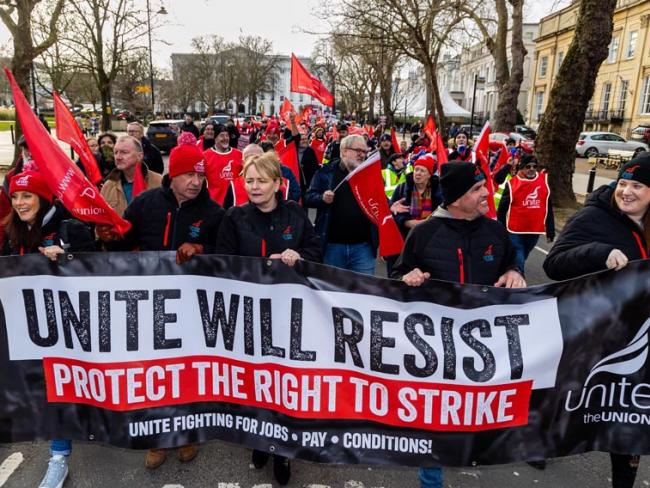21 February 2024

Unite contingent at the TUC demonstration, Cheltenham, 27 January. Photo Workers.
Workers across many sectors organised in Unite have recently secured over £430 million in additional pay and benefits because of successful disputes.
For many workers conditions for wage bargaining remain good. But the next round of claims will see employers try to regain some ground.
Many sectors
One example is the settlement for thousands of construction workers operating under the National Agreement for the Engineering Construction Industry. There workers won a 17.4 per cent pay rise over two years after a campaign that included the threat of coordinated industrial action. The employers originally offered 8.5 per cent for 2024 and 3.5 per cent for 2025.
Strike action in the Clyde shipyard at Scotstoun and at BAE Systems in Govan has brought further significant pay victories. Unite members working for CBL Cable Contractors called off their strike on 15 January after winning an increase of £3.05 per hour, and 22.8 per cent for the lowest paid.
Offshore drillers employed by Odfjell have won their demand for an improved working rotation, Unite announced on 26 January. That same day Cheshire refuse workers secured a pay rise of between seven and 11.1 per cent plus two days more annual leave after their vote for strike action.
Workers at Hitachi Rail operating for Great Western Railway and at Jaguar Land Rover also won rises above the rate of inflation. And Seagate workers making external hard drives have won trade union recognition.
Forecasts
Most wage claims are due to be submitted between April and June. The economic context will be important. The government has predicted a fall in inflation, as have economic forecasts by the Bank of England and others. But there are many uncertainties and official forecasts have been markedly inaccurate for some time.
‘Employers will use lower inflation figures to resist further pay claims.’
These figures will be used by employers in the next pay round to resist further pay claims. They will also point to a continuing decline in reported vacancies. But the reality is that many employers are finding it hard to recruit workers – certainly at the wages on offer.
But profits across most sectors remain buoyant – and falling inflation does not mean that prices are falling for the workforce. Quite the opposite, the cost of goods and services are still rising. In fact, inflation has risen by 30 per cent in four years.
Despite all these magnificent victories, just to stand still and maintain real pay levels Unite workers would need their pay to increase by the same percentage.
